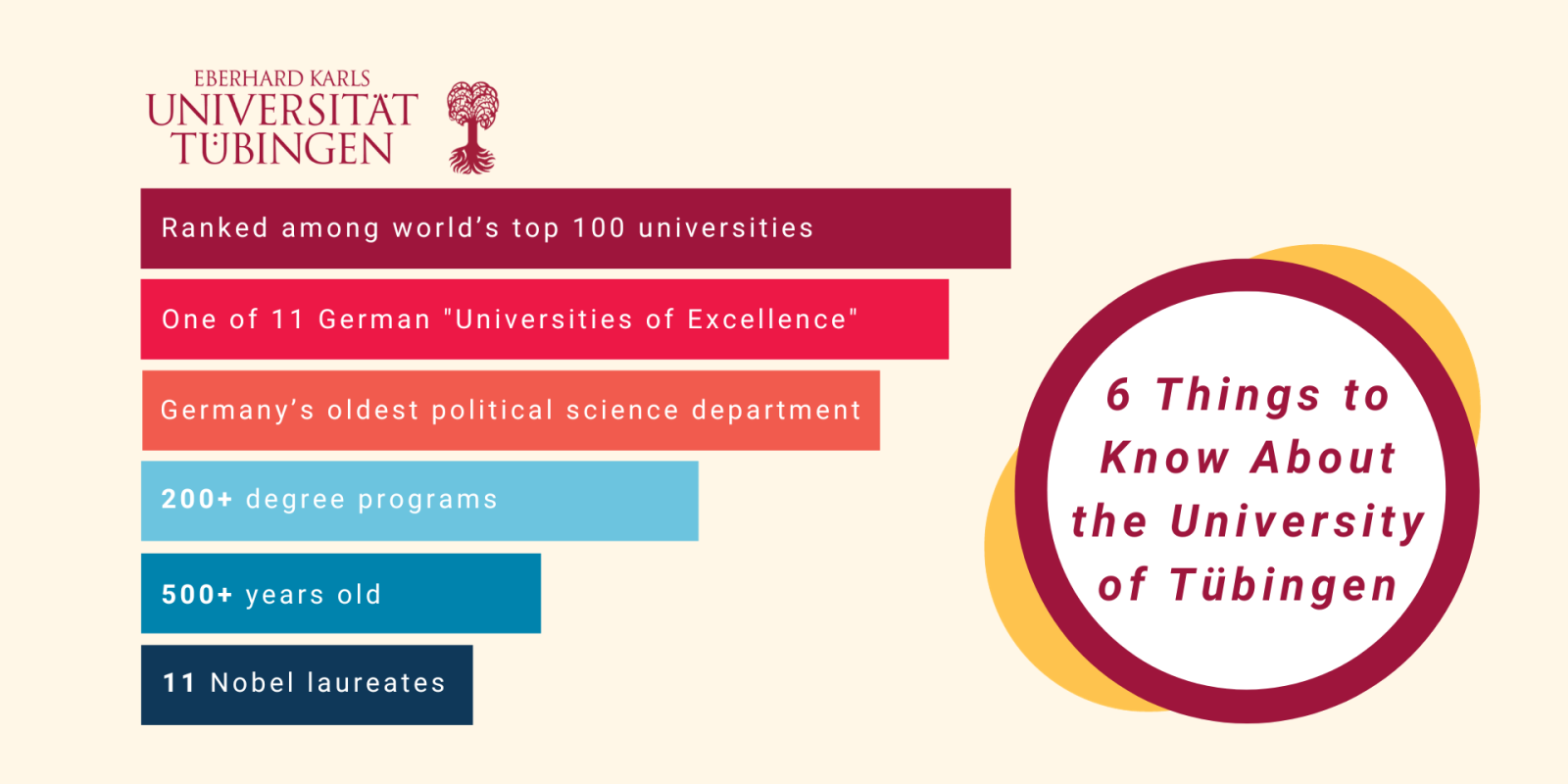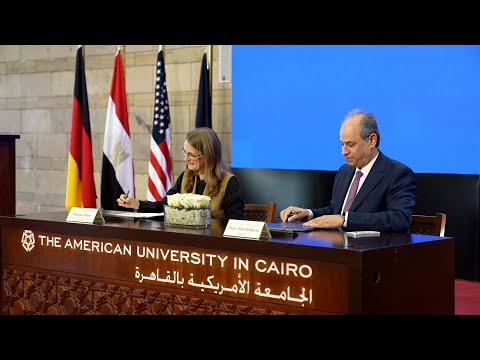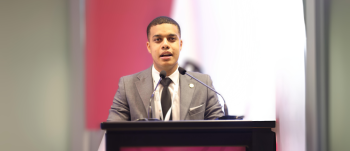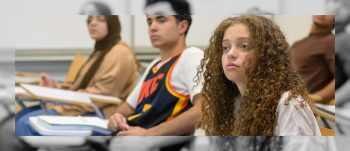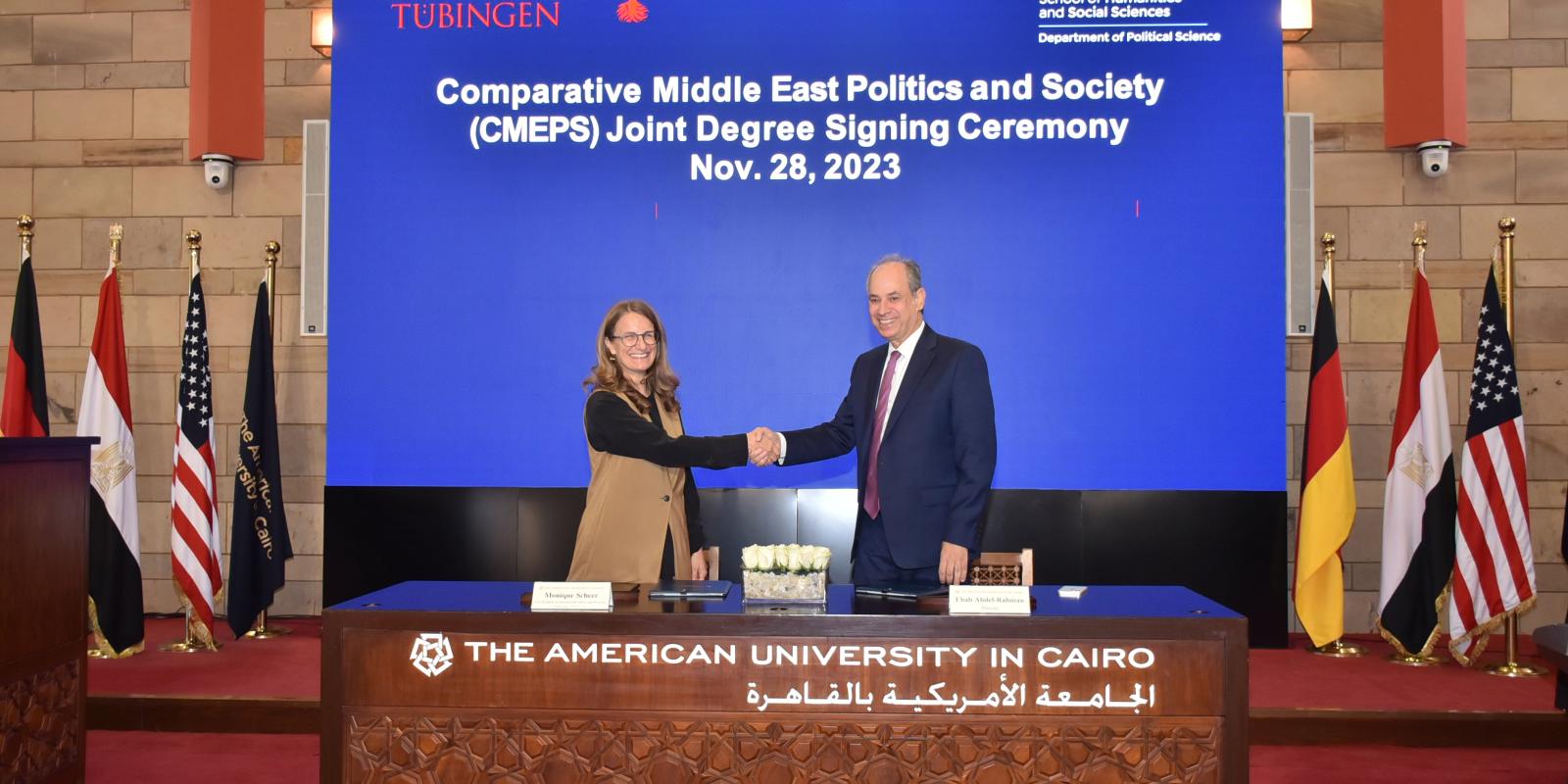
AUC, Tübingen Launch Joint Degree
The Master of Arts in comparative and Middle East politics and society (CMEPS), a joint program offered by AUC and Eberhard Karls Universität Tübingen in Germany, marks the first official joint degree between AUC and another university and the first master’s degree in political science accredited in Germany, Egypt and the United States –– a distinct offering of its kind.
AUC, University of Tübingen Offer Joint Political Science Master's Degree
Founded more than 500 years ago, in 1477, Tübingen is one of the oldest and most prominent universities in Germany. It is ranked among the world’s top 100 and is known for its excellence and innovation in research and teaching, as well as its longstanding research expertise in the Middle East and North Africa. Likewise, AUC’s political science academic programs leverage Cairo’s position as a key political, intellectual and cultural hub at the heart of the region and center of the Arab world.
“Our collaboration with Tübingen spans 10 years, and this is a vote of confidence in AUC,” said Nadine Sika ’97, ’00, associate professor of comparative politics and director of the CMEPS program at AUC. “The international structure allows students to be exposed not only to a wider variety of course topics but also to different classroom dynamics and cultural exchange.”
Exchanging International Expertise
The CMEPS program stands out for its immersive approach to teaching comparative political science. Students in the two-year program study at both universities, completing one semester away from their home university at the partner institution, which includes Arabic and German language study.
“My time as a CMEPS scholar was an unforgettable experience that I am very thankful for,” said Yasmina Elazazy ’16, ’21, coordinator of the Tomorrow’s Leaders Graduate Program at AUC and a CMEPS alum. “I really appreciate the interactive learning experiences offered through course workshops and field trips. I attended all of them and didn’t want my exchange semester to end.

Yasmina Elazazy
“Our collaboration with Tübingen spans 10 years, and this is a vote of confidence in AUC.”
Echoing the same sentiment, Leonie Mühlbauer, a CMEPS alum from the University of Tübingen, said, “The exchange semester at AUC and staying in Cairo allowed me to make friends worldwide and practice my Arabic daily. Classes were challenging but incredibly rewarding and worthwhile.”
Program cohorts are small, with a maximum of 20 students per year. “This facilitates opportunities for closer exchange between students and the many out-of-classroom learning experiences organized throughout the program,” said Sika.
“Over the past couple of decades, a truly transnational community of knowledge has emerged in social sciences that had long remained nationally based or at most transatlantic scholarly dialogues. CMEPS not only profits from that emergent community; it develops and fosters it in ways that future generations will benefit from deeply.”
Transnational Connections
Joint classes allow for dynamic interactions between Egyptian, German and other international students, and the University of Tübingen's Institute of Political Science –– one of Germany’s top-ranked political science institutions –– teaches some of the modules. The program highlights the relationship between societies and states in the MENA region as well as the dynamics of social and political transformation, focusing on comparative politics and development with an emphasis on the politics, society, cultures and languages of the Middle East.
“Over the past couple of decades, a truly transnational community of knowledge has emerged in social sciences that had long remained nationally based or at most transatlantic scholarly dialogues,” said Nathan Brown (CASA@AUC ‘84), professor of political science and international affairs at The George Washington University and an AUC trustee. “CMEPS not only profits from that emergent community; it develops and fosters it in ways that future generations will benefit from deeply.”
To promote the link between theory and practice, the program includes study trips to international organizations, development agencies as well as political and cultural institutions in both countries. “This allows our students to network with leading scholars in the field as well as professional experts and career diplomats,” said Sika.
Real-World Experience
Besides the semester abroad, the program also constitutes a practicum module whereby students complete an internship with a public or private organization working in the field, usually in the host country –– gaining firsthand and cross-cultural experiences as well as boosting their employability and career readiness. In addition, the program includes a joint international research colloquium.
“CMEPS caters to both academia and practice, providing students with hands-on learning and a unique international profile, which paves the way for their success in a variety of professional pursuits,” Sika added.
Indeed, program alumni have gone on to pursue careers in academia at respected universities in Egypt and around the world. Many have joined the ranks of global entities, such as the International Labour Organization and various UN agencies, while others have pursued careers in government, media, banking, research and civic service. “The focus on Middle East politics and societies paves the way for students to work in a wide range of careers, from development and diplomacy to NGOs and think tanks,” said Sika.
And alumni testify to that. “Being a CMEPS scholar really opened doors for me in my professional and academic careers,” Elazazy said. “Earning a degree from two prestigious universities was a huge bonus. I built the connections and knowledge that enabled me to begin working as a research assistant in AUC’s Department of Political Science after graduation, publishing research with leading professors in the field.”
